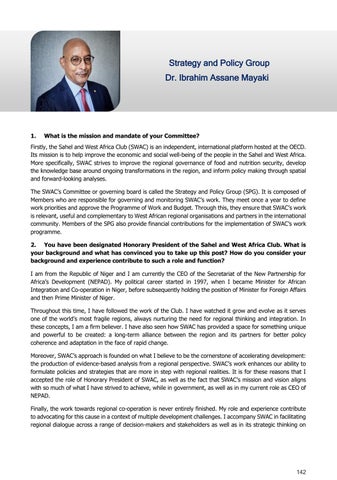Strategy and Policy Group Dr. Ibrahim Assane Mayaki
1.
What is the mission and mandate of your Committee?
Firstly, the Sahel and West Africa Club (SWAC) is an independent, international platform hosted at the OECD. Its mission is to help improve the economic and social well-being of the people in the Sahel and West Africa. More specifically, SWAC strives to improve the regional governance of food and nutrition security, develop the knowledge base around ongoing transformations in the region, and inform policy making through spatial and forward-looking analyses. The SWAC’s Committee or governing board is called the Strategy and Policy Group (SPG). It is composed of Members who are responsible for governing and monitoring SWAC’s work. They meet once a year to define work priorities and approve the Programme of Work and Budget. Through this, they ensure that SWAC’s work is relevant, useful and complementary to West African regional organisations and partners in the international community. Members of the SPG also provide financial contributions for the implementation of SWAC’s work programme. 2. You have been designated Honorary President of the Sahel and West Africa Club. What is your background and what has convinced you to take up this post? How do you consider your background and experience contribute to such a role and function? I am from the Republic of Niger and I am currently the CEO of the Secretariat of the New Partnership for Africa’s Development (NEPAD). My political career started in 1997, when I became Minister for African Integration and Co-operation in Niger, before subsequently holding the position of Minister for Foreign Affairs and then Prime Minister of Niger. Throughout this time, I have followed the work of the Club. I have watched it grow and evolve as it serves one of the world’s most fragile regions, always nurturing the need for regional thinking and integration. In these concepts, I am a firm believer. I have also seen how SWAC has provided a space for something unique and powerful to be created: a long-term alliance between the region and its partners for better policy coherence and adaptation in the face of rapid change. Moreover, SWAC’s approach is founded on what I believe to be the cornerstone of accelerating development: the production of evidence-based analysis from a regional perspective. SWAC’s work enhances our ability to formulate policies and strategies that are more in step with regional realities. It is for these reasons that I accepted the role of Honorary President of SWAC, as well as the fact that SWAC’s mission and vision aligns with so much of what I have strived to achieve, while in government, as well as in my current role as CEO of NEPAD. Finally, the work towards regional co-operation is never entirely finished. My role and experience contribute to advocating for this cause in a context of multiple development challenges. I accompany SWAC in facilitating regional dialogue across a range of decision-makers and stakeholders as well as in its strategic thinking on
142
















